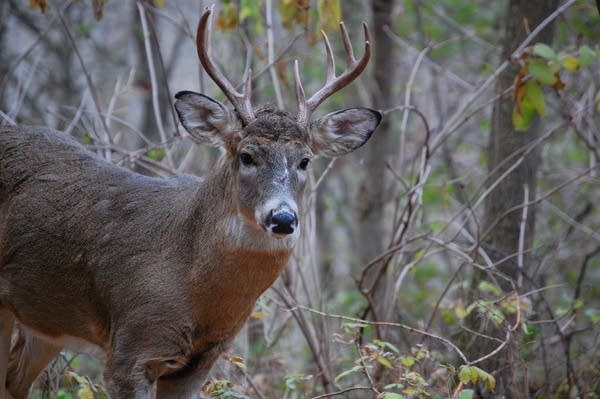Haulers' beef complicates deer disposal effort

Go Deeper.
Create an account or log in to save stories.
Like this?
Thanks for liking this story! We have added it to a list of your favorite stories.
Officials at the Minnesota Department of Natural Resources are scrambling to find a way to move thousands of deer carcasses, after a trash hauler suddenly refused to handle them just days before the opening of rifle season.
The disposal plan is part of a state effort to curtail the spread of chronic wasting disease that has been challenging from the start.
Last week, Waste Management, the largest trash disposal company in the United States, made the problem worse when it said because of concerns about liability it would not collect dumpsters placed around the state for deer hunters to dispose of carcasses.
The DNR is getting little sympathy from local trash haulers, who say the newest setback is the state’s own fault.
Turn Up Your Support
MPR News helps you turn down the noise and build shared understanding. Turn up your support for this public resource and keep trusted journalism accessible to all.
“This is what they deserve,” said David MacArthur, manager of Garrison Disposal in Crow Wing County.
You need to understand a little bit of trash hauling history to understand why haulers like MacArthur are upset.
For many years, the state of Minnesota contracted with small local haulers to pick up garbage at state facilities: prisons, court houses and the offices of the DNR. Then in June, the state dropped all those small contracts in favor of one big one, with Waste Management.
“You drop me and then your favored boy doesn’t want to do the work?” MacArthur said. “If they call me, I’m going to say, ‘Why don’t you use the company that you picked when you dropped me?’ Hold their feet to the fire.”
MacArthur submitted a bid to empty the Crow Wing County deer dumpsters months ago when the DNR was just setting things up. They turned him down again — again in favor of their contract with Waste Management.
So last week, when Waste Management refused to haul deer carcasses, McArthur’s had no pity for the DNR. And he was not alone.
Crow Wing County Administrator Tim Houle said the state burned a lot of bridges with local trash haulers.
“Waste Management basically took the state’s business away from those small independent haulers,” he said. “Put many of them out of business. Ask one of those small haulers about the state’s bidding process. He got muscled out.”
The DNR really needs guys like MacArthur right now. This weekend, thousands of hunters will take to the woods in the Crow Wing County CWD zone.
The local landfill is still accepting carcasses, but most hunters probably won’t make a long drive to drop off some deer bones. If the DNR doesn’t find a way to get dumpsters placed around the region, and then shipped to the landfill, quite a few carcasses will get left in fields — possibly spreading disease to other deer.
Houle said that’s not acceptable. Handling this hunting season correctly is particularly important in Crow Wing County.
So far, only one wild deer has tested positive for CWD in the area and Houle said it’s still possible to eradicate the disease in Crow Wing. But the effort is being derailed, he said, not just by deep-seated resentments within the trash hauling industry, but by the fear of lawsuits.
Wildlife managers across the country are having a hard time finding landfills willing to take deer parts infected with CWD because landfills are afraid of being sued if the disease spreads. It’s the same reason Waste Management gave for refusing deer carcasses.
“Who should accept the risk for this? That’s really the question” Houle said. “This is an instance in which we all must accept the risk collectively, and by that, I mean it’s the government’s risk.”
Houle said the state should have taken on Waste Management’s liability, and then fired them if they still refused to move the carcasses.
Assistant DNR Commissioner Bob Meier said the agency doesn’t have the authority to take on liability for infectious deer bones.
Dumpsters are already in place in southeastern Minnesota, where the disease is well established. But the DNR is still negotiating with trash haulers in Crow Wing County.
On a conference call Monday, DNR officials said they think they're close to making a deal. They hope to have 20 dumpsters in place, across the state, by hunting opener. If all else fails, Meier said DNR staff will rent dump trailers and haul deer bones themselves.
“We remain very positive that we will have solutions in place in Crow Wing County by a half hour before sunrise on Nov. 9 when the rifle season starts,” Meier said
Whatever that solution turns out to be, David McArthur at Garrison Disposal, said he couldn’t be paid enough to be part of it.
“They turned me down twice,” he said. “I have pride.”


